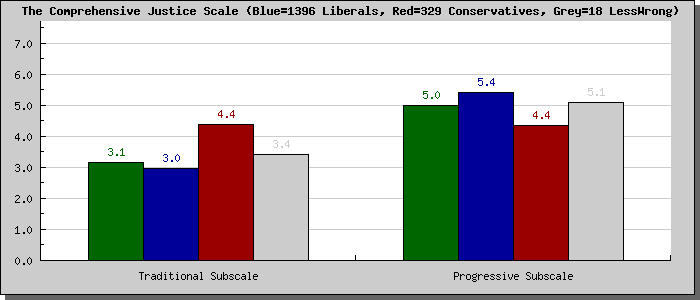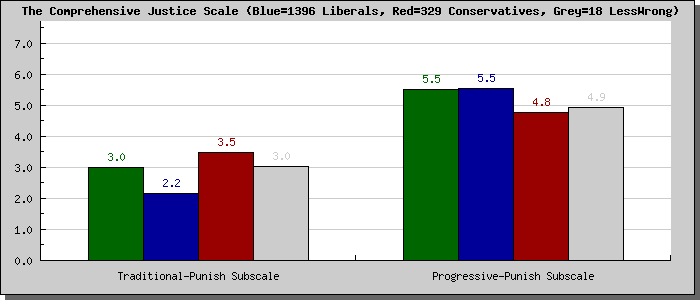YourMorals.Org |
||||
| Home |
Logout | Explore Your Morals | About Us | Links |
| Welcome gwern0@gmail.com - logout | ||||
|
The scale you completed was the “Comprehensive Justice Scale,” which is currently being developed by Jonathan Haidt at the University of Virginia, and John Darley and Dena Gromet of Princeton University. The scale is a measure of your attitudes toward crime and punishment. Some of the items reflected a “progressive” and less punitive attitude toward criminals (for example agreeing with the statement that “punishment should be designed to rehabilitate offenders,” and being opposed to the death penalty). Other items reflected a more “traditional” attitude, including a willingness to use traditional forms of punishment, such as shaming or flogging. We grouped these two kinds of items together to give you a “progressive” and a “traditional” score in the first graph below. We call this the "comprehensive" justice scale because research on justice and punishment has usually taken either a liberal or conservative approach. We are trying to examine the broadest possible range of ideas and intuitions about what you think should happen to the offender, and the victim. Disagreements about crime and punishment have long been at the heart of the "culture war." By linking your responses here to the information you gave us when you registered, or when you took other surveys, we hope to shed light on what kinds of people (not just liberals and conservatives) endorse what kinds of responses to crime, and why. The graph below shows your scores (in green) on the items from the first page, compared to those of the average liberal (in blue) and the average conservative (in red) visitor to this website. The scale runs from 1 (lowest score) to 7 (highest score).
 The second graph shows your results from the items on page 2,
where we asked about "alternatives to prison." This page should produce
similar results to what you see from Page 1. We expect liberals to favor
the more lenient and rehabilitative alternatives, and conservatives to
favor the more punitive options. We are trying out various ways of
asking these questions to see which format, or combination of formats,
produces the best measurement of people's attitudes.
 For more information about the psychology of justice, see research by John Darley, including this paper. |
Return to the "Explore" page.
|